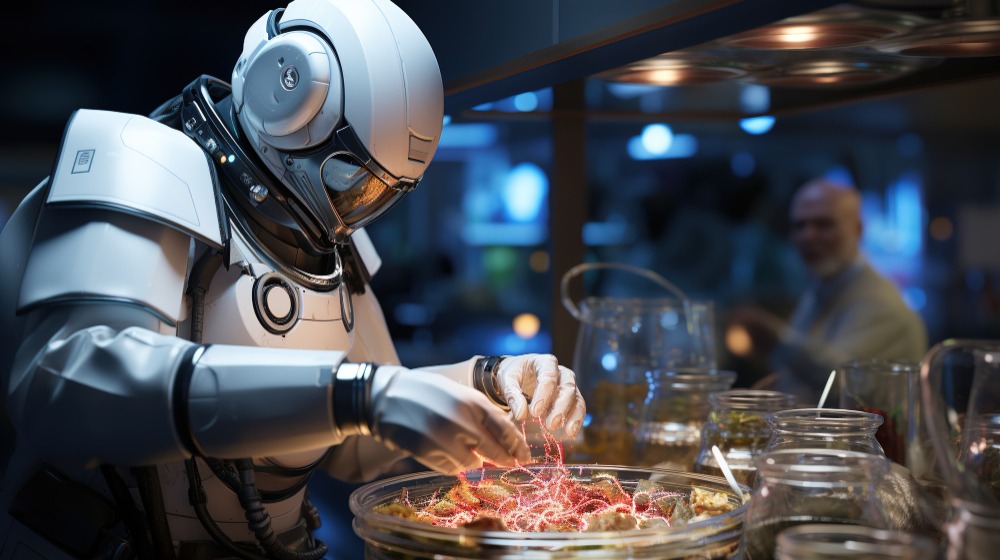Food television has captivated audiences for decades. From instructional cooking shows to competition-based culinary battles, these programs offer entertainment, education, and a window into the world of professional chefs. However, the rise of Artificial Intelligence (AI) is poised to significantly impact the food entertainment landscape. Could AI be the secret ingredient behind your next favorite recipe show?
The Allure of Food Entertainment: Why We Watch
Food shows tap into a universal human need: nourishment. Beyond basic sustenance, food is a source of comfort, culture, and shared experiences. Food entertainment offers viewers several benefits:
- Learning New Skills: Cooking shows provide valuable lessons and inspiration, motivating viewers to experiment in the kitchen.
- Vicarious Thrills: Competition programs offer a high-stakes environment, allowing viewers to experience the thrill of culinary challenges without the pressure.
- Entertainment and Relaxation: Food shows can be a source of comfort and entertainment, offering a relaxing escape from daily routines.
- Global Culinary Exploration: Foodie shows expose viewers to diverse cuisines and cultures, broadening their culinary horizons.
The Rise of AI in the Kitchen: From Recipe Recommendations to Automated Chefs
The field of AI is rapidly evolving, impacting various aspects of our lives, including our kitchens. Here’s a glimpse into AI’s growing presence in the culinary world:
- Smart Recipe Recommendations: AI-powered recipe platforms like Yummly and Pepperplate analyze user preferences and dietary restrictions to recommend personalized recipes.
- Automated Meal Planning: AI can create customized meal plans based on specific needs, allergies, and budget constraints.
- Virtual Cooking Assistants: Platforms like Amazon’s Alexa and Google Assistant offer voice-activated recipe instructions and kitchen timers, streamlining the cooking process.
- AI-Powered Kitchen Appliances: Smart ovens and refrigerators equipped with AI can suggest recipes based on available ingredients or even autonomously prepare meals based on pre-programmed settings.
Can AI Create Compelling Food Entertainment? The Challenges and Potential
While AI offers exciting possibilities for recipe development and kitchen automation, its potential role in food entertainment remains debatable. Here’s a breakdown of the challenges and potential benefits:
Challenges:
- Lack of Creativity and Human Touch: AI algorithms excel at data analysis and recipe optimization, but can they replicate the creativity, spontaneity, and storytelling ability of human chefs.
- The Emotional Connection: Food shows rely heavily on the personalities, rivalries, and emotional journeys of chefs. Can AI convincingly recreate these elements to engage viewers on a deeper level.
- The Value of Experimentation and Mistakes: Learning from culinary failures is a crucial part of the cooking experience. Can AI shows capture the messy, unscripted moments that make food shows relatable
Potential Benefits:
- Personalized Viewing Experiences: AI could personalize food shows to viewers’ tastes and dietary preferences, creating a more immersive and engaging experience.
- Global Recipe Exploration with AI-Powered Translation: AI tools can translate recipes and cooking instructions in real-time, opening doors to exploring global cuisines without language barriers.
- Accessibility and Education for All: AI-powered recipe shows could create interactive learning experiences, making cooking accessible to viewers with varying skill levels.
- Efficiency and Resource Management: AI could analyze ingredient usage and suggest substitutions, promoting sustainability and reducing food waste.
The Future of Food Entertainment: A Collaborative Approach
Instead of a complete AI takeover of food shows, a more likely scenario is a collaborative approach. Here’s how humans and AI could work together:
- AI-Powered Recipe Development: AI can assist human chefs by generating innovative recipe ideas based on ingredient combinations and dietary restrictions.
- Enhanced Production and Visual Effects: AI could analyze audience preferences and generate customized visuals or special effects within food shows, making the content more visually appealing.
- Interactive Features and Gamification: AI can power interactive elements within food shows, allowing viewers to create personalized meal plans or compete in virtual cooking challenges.
AI on the Menu: How Artificial Intelligence is Revolutionizing Food Ordering and Delivery
Gone are the days of waiting on hold or deciphering cryptic menus. Artificial intelligence (AI) is rapidly transforming the food ordering and delivery landscape, offering a more convenient, personalized, and efficient experience for both customers and restaurants. Let’s delve into the delicious world of AI-powered food ordering and explore how it’s changing the way we eat.
From Pixels to Plates: How AI Streamlines Food Ordering
AI is quietly working behind the scenes to make online food ordering a breeze:
- Smart Recommendations: AI algorithms analyze your past orders, dietary preferences, and even location data to suggest dishes you might enjoy. This personalized approach eliminates the stress of browsing through endless menus.
- Voice Ordering Convenience: Virtual assistants like Alexa and Google Assistant allow you to place orders using voice commands. This hands-free approach is perfect for busy mornings or multitasking in the kitchen.
- Chatbot Assistance: AI-powered chatbots can answer your questions about menu items, delivery times, or special offers. This eliminates the need to call the restaurant and provides 24/7 customer support.
Beyond Convenience: The Efficiency Boost for Restaurants
AI isn’t just a boon for customers; it also empowers restaurants to operate more efficiently:
- Order Prediction and Inventory Management: AI can analyze past order data to predict peak hours and customer preferences. This allows restaurants to optimize their inventory levels and ensure they have the necessary ingredients on hand to meet demand.
- Personalized Marketing and Promotions: AI can identify customer segments with similar ordering patterns and target them with personalized promotions and offers. This targeted marketing approach helps restaurants increase sales and build customer loyalty.
- Automated Kitchen Operations: AI-powered systems can streamline kitchen operations by routing orders to the appropriate stations and optimizing cooking times. This reduces wait times and ensures a smooth workflow in the kitchen.
The Future of Food Delivery: From Drones to Driverless Cars
The future of food delivery promises even more innovation with AI at the helm:
- Autonomous Delivery Vehicles: Imagine a world where drone delivery or self-driving cars deliver your favorite pizza or steaming bowl of noodles. While regulations are still being ironed out, AI has the potential to revolutionize the last-mile delivery process.
- Real-Time Order Tracking: AI-powered tracking systems can provide real-time updates on your order’s progress, allowing you to see exactly where your food is and when it will arrive. This eliminates the anxiety of waiting and wondering when your meal will show up.
- Hyper-Personalization and Customization: AI could personalize your food delivery experience even further. Imagine a system that suggests side dishes that perfectly complement your meal or allows for real-time customization of spice levels or ingredients.
The Ethical Plate: Considerations for AI in Food Ordering
While AI offers exciting possibilities, it also raises ethical concerns that need to be addressed:
- Bias in Algorithmic Recommendations: AI algorithms can perpetuate biases based on past data. Ensuring algorithms are fair and inclusive is crucial to prevent discrimination in food recommendations and promotions.
- Job Displacement in the Food Industry: As AI streamlines operations, some jobs in the food service industry could be lost. Addressing potential job displacement and retraining programs will be crucial.
- Data Privacy and Security: Food ordering platforms collect a significant amount of user data. Ensuring robust data privacy measures and security protocols are essential to protect customer information.
Conclusion
AI is undoubtedly transforming the food ordering and delivery landscape. From personalized recommendations to streamlined restaurant operations, AI offers a win-win situation for both customers and restaurants. However, ethical considerations must be addressed to ensure AI serves an inclusive and equitable future of food for all. As AI continues to evolve, one thing’s for sure: the way we order and enjoy our meals is destined to become even more convenient, personalized, and perhaps even a little futuristic.


